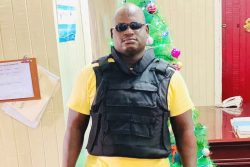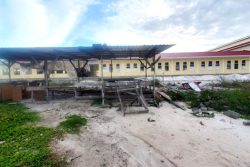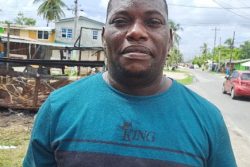CARACAS, (Reuters) – Venezuelan President Nicolas Maduro yesterday proposed early parliamentary elections, seeking to shore up his crumbling rule after a senior general defected to the opposition and tens of thousands thronged the streets in protest at his government.
As domestic and international pressure on Maduro to step down mounts, a senior air force general disavowed him in a video that circulated earlier yesterday, expressing his allegiance to parliament head and self-proclaimed interim president Juan Guaido.
The military’s support is crucial for Maduro, who is deeply unpopular, largely due to an unprecedented economic crisis that has prompted an exodus of millions. Maduro claims he is victim of a coup directed by the United States.
In a speech to supporters, Maduro said the powerful government-controlled Constituent Assembly would debate calling early elections for the National Assembly parliament, which is opposition-controlled.
Guaido has called for a new, fair presidential election after the disputed vote won by Maduro last year.
“You want elections? You want early elections? We are going to have parliamentary elections,” Maduro told a pro-government rally in Caracas, held to commemorate the 20th anniversary of late socialist leader Hugo Chavez’s first inauguration as president.
Opposition lawmaker Armando Armas said in a statement that proposing bringing forward the parliamentary elections, which were scheduled for 2020, was just another act of provocation.
“Maduro is not president and the Constituent Assembly has no legitimacy, no value,” he said.
While small rebellions against Maduro have broken out in Venezuela’s armed forces in recent months, there has been no large scale military uprising against him.
However, General Francisco Yanez of the air force’s high command became the first active Venezuelan general to recognise Guaido since he proclaimed himself president on Jan. 23. Venezuela’s chief military attache to the United States also said he was defecting last week.
“People of Venezuela, 90 per cent of the armed forces of Venezuela are not with the dictator, they are with the people of Venezuela,” Yanez said in the video.
“Already the transition to democracy is imminent.”
On its Twitter account, the air force’s high command accused the general of treason.
At an opposition rally in Caracas, Guaido told his supporters he expected more to follow Yanez’s example. He has offered the military and public officials amnesty if they defect.
“I am certain many officials and soldiers will repeat this gesture, very soon, very soon,” he said.
The rally was one of many nationwide yesterday, where demonstrators decked out in the yellow, red and blue of the Venezuelan flag honked horns, pounded on drums and chanted “Guaido, Guaido, Guaido.”
“It’s been years of destruction of companies and poverty,” said Pedro Gimenez, 51, a worker in an aluminum factory in the southern state of Bolivar. “We want a better present and future and we are about to achieve that.”
In a possible sign of Maduro’s weakening support, riot police who had planned on blocking demonstrators from reaching the rallies, decided to let them pass in at least three cities, according to Guaido and Reuters witnesses.
PRESSURE GROWING
Humanitarian aid would soon flow into crisis-stricken Venezuela from collection points in Brazil, Colombia and a Caribbean island, Guaido said, without specifying who was providing the aid.
On Friday, U.S. Secretary of State Mike Pompeo said that the United States stood “ready to provide assistance to the people of Venezuela.”
Guaido said the opposition would not let up on protests until Maduro stepped down and allowed free elections. The self-declared president has no control over state institutions or any functions of day-to-day governance.
As well as the United States, Canada and several Latin American nations have already officially recognised Guaido. Some European Union member states are expected to officially recognise Guaido next week, while others will likely take a more cautious stance of support. Maduro still has the backing of Russia and China.
In a bid to pressure Maduro financially, Washington has imposed sweeping sanctions on state-owned oil firm PDVSA, although these risk exacerbating the plight of ordinary citizens by curtailing hard currency necessary for imports.
“(U.S. President Donald) Trump is imposing measures because he is the dictator of the world and thinks we are his slaves,” said Gregory Carrasquel, 35, at the pro-government rally in Caracas, attended by many public sector workers wearing the trademark red socialist shirts.
“For us Venezuelans, there is only one president – President Nicolas Maduro.”








